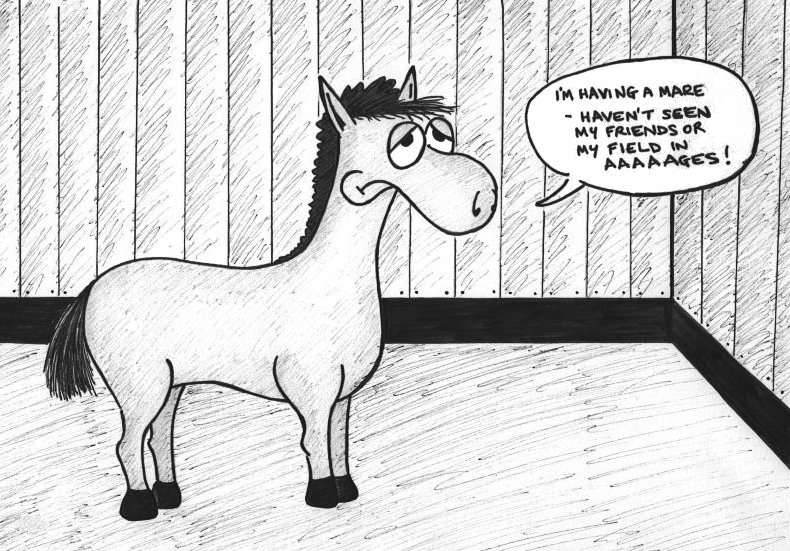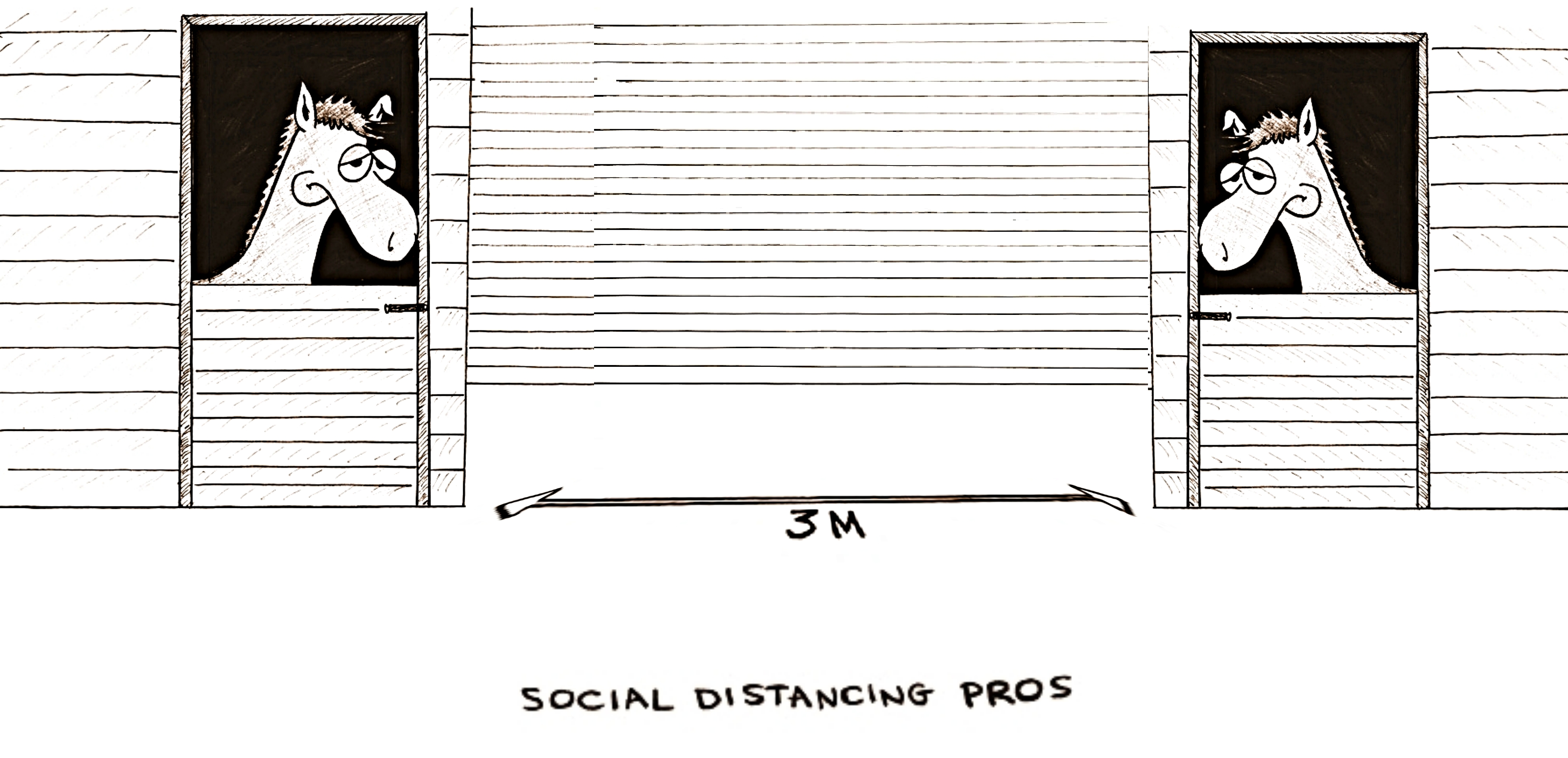Have you exhausted your favourite Netflix series? Are you craving the company of friends, eating out at your local restaurant or (like me) missing hugs!? We have all felt the stress of late as our life choices, free movement and social activities have been curtailed.
Just like us, our horses can feel anxious when aspects of their lives are restricted. In just the same way as a person in lockdown, the mental, physical, and emotional well-being of a horse can be adversely affected by isolation.
For a prey animal designed to live in a social group for survival, it is likely that stabled horses feel stress even more than we do. We can choose to attend online fitness classes, see friends via Zoom or become blissfully acquainted to Ben and Jerry (or Haagen-Dazs in my case!). As tough as it may be, we can console ourselves that our social distancing will soon end. But how do our super-sociable, athletic horses manage when on lockdown?
The truth is, they often don’t. Horses would naturally roam up to 80km each day, forage on a vast variety of plant species and hang out with whom they choose, when they choose. That’s even more choices than we have with toilet-roll brands in a supermarket! Pre-lockdown.
Contemplate living mostly in one small room, without social contact or choice of freedom… We are also sociable beings, designed to move our bodies and socialise, just like your beloved horse.
“But my horse LOVES his stable!”
Stabling our equine companions originates from a time when horses used to work the land, transport us from A to B, carry us into battle even. We safely housed them for space-saving and convenience. And so stabling, in its different forms, became part of our culture, ‘the norm’ for most domestic horses.
So why will a horse who is designed to roam grassy plains with a band of friends and family go so willingly into a stable? Well, it helps that some appetising, comfortable things await in stables, such as a pile of hay, dinner delivered to the door, shade, and a dry bed to rest. This may go some way to explaining why entering a stable doesn’t appear aversive to a horse, if anything these motivators mean they can be very keen to get in there! Sadly, this conditioning isn’t always what it seems…
When we Know Better, We Do Better
To explain further, I would like to share a personal story: Many years ago, before I qualified as an Equine Behaviourist, I housed my own horses at a livery yard where they were stabled for a considerable amount of the day (season depending). My mare began to weave at the stable door before being let out in the morning, and my gelding’s bed was often wrecked through his night-time box walking. Whilst these things quietly troubled me, I accepted these behaviours as things they ‘just did’ as part of their character or personality traits. I didn’t know better back then.
It is also useful to know that some horses who appear to tolerate more time stabled (as many seem to) may have learned certain coping mechanisms. Some can become lethargic, ‘grumpy’, ‘aggressive’, or even hyper-reactive in different situations. Even more worrying perhaps, some horses learn that these coping behaviours do not bring about change in their situation, so they become introvert and suffer in silence without any obvious outward signs of distress.
My own journey into understanding the science of equine behaviour, and ethology, gave me a better understanding of what horses fundamentally need as a species. As humans we are still learning about equine psychology, but if we simply begin to understand how our horse’s ancestors survived and thrived, we will be able to provide them with the appropriate environment where they can enjoy quality of life, and live as naturally as possible within 21st Century limitations.
As for my little herd, nowadays I’m fortunate to have my own small holding where my horses are able to come and go between fields, shelters, and surfaced areas as they please, and thankfully they don’t display any stress related, stereotypic behaviour any longer. One key thing I learned is that regardless of a horse’s past experience or learning, it is their CURRENT environment, daily routine, social life and diet which is the main influence on mental equilibrium and behaviour.

The End of Social Distancing: FACTS
FACT 1 – THE END OF ‘STABLE VICES’?
There is a reason that undesirable behaviours such as weaving, box walking, crib-biting, wind-sucking, tongue twisting, etc. became known as ‘stable’ vices.
Stereotypic behaviours simply do not occur in nature!
They are seen far less too when horses live outside or are housed in ‘freedom areas’ where they move more freely and socially.
FACT 2 – A STABLE LIFE, OR AN UN-STABLE HORSE?
Because of the complexities of the mind and learning processes there may always be a need for qualified pet behaviourists (and human therapists!). However, in my experience, up to 50% of cases assessed by equine behaviourists would naturally resolve if we ended equine ‘social distancing’. By allowing horses to live and express themsleves in an environment natural to their species, many handling, loading and ridden problems would resolve with no ‘professional’ intervention.
We have all had times during the recent lockdown when we felt more irritable, bored, or frustrated than usual. Perhaps in a heated moment you may have even threatened divorce (and later regretted it!) to your beloved? It makes sense that when we facilitate more CHOICE, MOVEMENT and SOCIAL LIFE for our equine friends, it changes their neuro-chemical make-up, provides physical and emotional satisfaction, and helps them to feel more relaxed and balanced.
Many challenges we see and deal with are linked to a confined stabled life which may lead to an UN-stable horse!
FACT 3 – GOING OUT IS THE NEW STAYING IN!
Many international competition horses, in various disciplines, live out 24/7. This may seem surprising given their value and status, but when stabled, these talented athletes either don’t thrive or simply CANNOT perform so well. Keeping a human athlete locked down eating pasta for breakfast, lunch and dinner, in a small room would also affect their performance as well as their sanity!
FACT 4 – A SOCIAL CHILDHOOD = A BALANCED ADULT (HORSE!)
It is that magic time of year when beautiful foals are springing forth and so many horse lovers are desperate to give their youngsters the best possible start in life. It isn’t always easy, and there are many misconceptions out there. Generally, though, enabling youngsters to enjoy a natural upbringing including the education that being in a mixed herd brings, equips them for life.
Sadly more behaviour challenges are seen in horses that weren’t socialised as youngsters or were kept stabled for longer periods.
It is a bit like home schooling a child who doesn’t have the opportunity to socialise with siblings or friends outside the home, resulting in a lack of essential life skills.
The Future
Keeping horses is about compromise; a happy middle ground between their needs and what we might expect in return for free food and lodging! We all want our horses to thrive, so here are some practical ideas to try:
- If your space or grazing is tight, try increasing your horse’s freedom time by turning out in a sacrifice area or an arena with forage and a companion. If stabling is unavoidable, hand grazing can help during those long winter months inside.
- Plant horse-friendly hedging alongside their paddock. Your horse loves to forage, and his/her essential gut microbiome will throw a party too!
- If possible, safely fence and surface an area by the stable so your horse can move more freely. Perhaps surprisingly, horses mostly CHOOSE to be outside (even in the rain or wind) if it means they are closer to equine friends. Surfaces with rubber mats, sand or bark in which horses love to roll, these ‘patio’ areas, or larger freedom areas are loved by sociable horses.
We have much still to learn, not only about horses, but from them! The sensitive and amiable nature of these amazing creatures have allowed man to enjoy incredible bonds through the ages. What other animal offers us a work horse (literally!), social companion and lifestyle outlet, all in one wonderful package?! My wish is that the extraordinary gifts from which we benefit and learn so much, are met with ever more understanding and kindness.
We are in a time of an ‘equine evolution’ and one aspect is that more and more evolved horse owners, forward-thinking equestrian centres, and companies are adopting these concepts.
We in the horse-world are realising that not only are horses happier and more relaxed when they’re out in company, but they are better under saddle too – a win-win!
If I could wave a magic wand it would be to speedily progress the end of social distancing, not only for ourselves, but moreover for our wonderful horses, forever.

